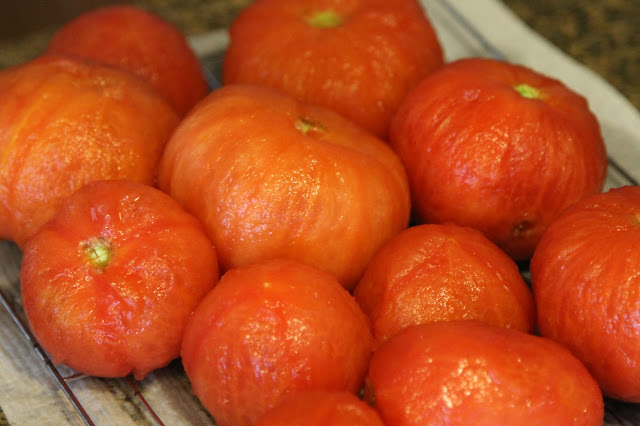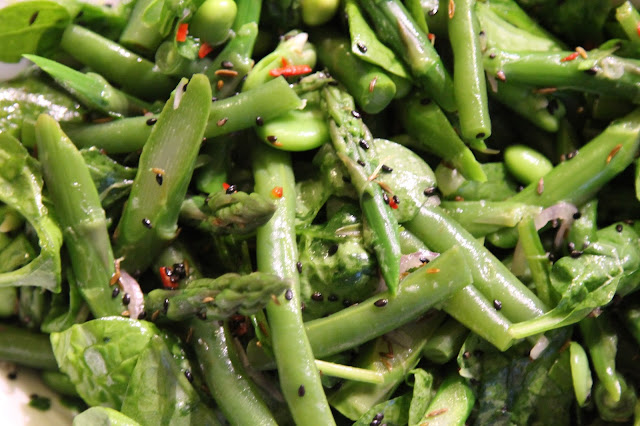Throughout my life, I've always surprised people by claiming the yellow lemon Starburst to be my favorite. While the general population would emphatically select pink (which is the worst, in my opinion) or red (which was cherry, not fruit punch, a heated topic of debate just last night), I would gladly scoop up all of the leftover lemons and feel like I'm the best Starburst partner in the world. I never really understood why my taste preferences were so "different." And then, when I got older, I found (and still find) myself continuously ordering one of my favorite cocktails: Caipirinha, Pisco Sour, Daiquiri, Mojito. The common ingredient? Lots of citrusy lime. So I came to the conclusion, I am a true lime and lemon lover.
And for all my fellow lemon lovers, here is a fantastically unique salad recipe for you. And for those not classified as lemon enthusiasts, you will still find this fabulous with perhaps a scaled down quantity of lemon. To put this into perspective, for a recipe that "serves four," we're looking at two full medium lemons...rind and all. But, of course, Ottolenghi know's his lemons and how to make consuming a full lemon a natural experience, void of the sour patch pucker.
The secret? Slice thin (a must - make sure you have a good, sharp knife), boil/blanch, and roast. Who would have thought?
The blanched lemon slices are tossed with olive oil, salt, sugar and sage before mellowing out in the oven for 20 minutes. After this process, you no longer have you traditional lemon that you may reserve for squeezing into a glass of water or for zesting up your salad dressing. Now that lemon has transformed into an almost rich and tangy ingredient that adds both depth and understated brightness to a dish full of fresh and juicy ingredients.
Tomatoes are still in season and I'm doing my best to soak up their summer sweetness. The "brown" ones tend to be my favorite but I love buying the mixed varieties for added color and flavor variety.
Mix the fresh tomatoes and rich, roasted lemons together, add a fresh layer of herbs and some pungency of sliced red onions (again, thin is key) and you've got a relatively easy and refreshing summer dish that travels and keeps quite well!
Tomato and Roasted Lemon Salad
p. 54 in Plenty More
serves four
Ingredients:
- 2 medium onions, halved crosswise, seeds removed, and cut into paper-thin slices (9 oz/260 g)
- 3 tbsp olive oil
- 1/2 tsp superfine sugar
- 8 sage leaves, finely shredded
- 2 2/3 cups/400 g baby tomatoes, yellow or red or a mixture of both, halved
- scant 1/2 tsp ground allspice
- 1/3 cup/10 g flat-leaf parsley leaves
- 1/2 cup/15 g mint leaves
- seeds of 1 small pomegranate (2/3 cups/120 g)
- 1 1/2 tbsp pomegranate molasses (note: Whole Foods was out so I made my own using Alton Brown's simple method found here - just use pomegranate juice, lemon and sugar and cook down)
- 1/2 small red onion, thinly sliced (about 1/2 cup/50 g)
- salt and black pepper
Directions:
- Preheat the oven to 325 F/170 C.
- Bring a small saucepan of water to a boil, add the lemon slices, and blanch for 2 minutes. Drain well, place the lemon in a bowl and add 1 tablespoon of the oil, 1/2 teaspoon of the oil, 1/2 teaspoon salt, the sugar and the sage. Gently mix and then spread the lemon mixture out on a baking sheet lined with parchment paper. Place in the oven and cook for 20 minutes, until the lemons have dried out a little. Remove and set aside to cool.
- In a bowl, combined the tomatoes, allspice, parsley, mint, pomegranate seeds, pomegranate molasses, onion, the remaining 2 tablespoons oil, 1/4 teaspoon salt, and some freshly ground pepper. Add the lemon slices, stir gently, and serve.
We served this with a simple pan-fried fish and quinoa. The fish was Onaga which is a Hawaiian Red Snapper and came highly recommended by the guy at the fish department at Eately. We were not disappointed. It was flakey and meaty and sweet and perfectly cooked (thanks to Derek). That, served with a bright Rose wine was a beautiful Sunday night meal that bright and satisfying.

























































